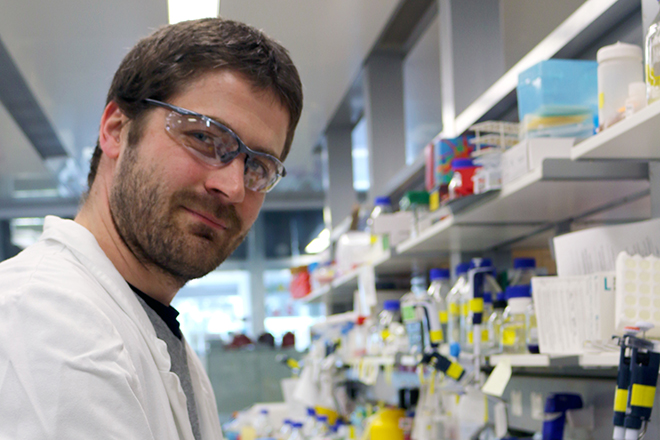
Associate Professor Marco Herold
Through all the challenges we’ve faced in the past year, there’s been one big thing giving us hope: the ground-breaking cancer research projects you help fund. 2021 sees an amazing 13 projects launching.
Chosen for their high likelihood of making a significant breakthrough in cancer treatment, this fascinating, life-saving work is taking us closer to a cancer free future. Thank you for supporting this vital work. After the huge difficulties people affected by cancer have faced in the last year, you are ensuring there will be a much brighter future for Victorians who receive a diagnosis by making this possible.
Fine-tuning immunotherapy for breast cancer treatment
Recent years have seen significant advances in immunotherapy, a treatment method in which a patient’s immune system is tuned to eliminate cancer cells. These therapies boost immune cells that are potent in killing cancer, but the killer function of these immune cells could be dampened by regulatory T cells, or Tregs – preventing the effectiveness of such treatment.
Dr Ajithkumar Vasanthakumar and his team are studying how to block Tregs to help boost anti-tumour immunity in breast cancer patients.
“The aim is to discover molecules that could be used to specifically target tumour infiltrating Tregs,” Dr Vasanthakumar said.
“Combining this targeting strategy with checkpoint blockade will lead to more effective immunotherapy treatment for breast cancer patients.”
Dr Vasanthakumar said this could have big impacts for people affected by cancer.
“As an immunologist, I am passionate about harnessing the power of immune cells to treat cancer. I strongly believe tumour-specific Treg targeting will change the way we treat cancer in the future.”
Finding the genes that cause familial ovarian cancer
You’re also helping Professor Ian Campbell and his team crack an ovarian cancer mystery: which genes cause it to run in families?
While many ovarian cancers run in families, less than half are caused by known genes such as BRCA1. Not knowing the inherited genetic cause of ovarian cancer can significantly increase risk for many women.
But Prof Campbell has identified more than 40 new genes that potentially cause ovarian cancer. He and his team will use several innovative approaches to combine genomic and genetic data to find the role of these genes.
“Identifying genes predisposing to ovarian cancer is a highly cost-effective mode of assessing risk in families predisposed to ovarian cancer, and may mean that many women will be able to prevent ovarian cancer from occurring in the first place, or at the very least detect it sooner,” Prof Campbell said.
“Finding new ovarian cancer predisposition genes may also help develop new treatment options for improved outcomes.”
Learning what one mutant enzyme does to cause leukaemia
Acute myeloid leukaemia (AML) can have a rapidly lethal outcome for patients without effective treatment, meaning new therapies are urgently needed. Understanding the DNA-modifying mutant enzyme DNMT3a, known to help cause and continue the growth of AML, could offer a clue into how to better treat this devastating disease.
Thanks to your support, A/Professor Marco Herold will be studying the role of this enzyme in AML. Recent studies have shown complex networks of mutations in AML patients, with one of the most common found in DNMT3a.
This enzyme could help reveal novel cancer-causing pathways in AML – and have a significant impact on new treatments.
“Identifying the abnormalities of this enzyme’s role in AML will open new possibilities for developing drugs to improve the treatment, thereby improving the quality of life and future prognosis for patients presenting with this devastating disease,” A/Prof Herold said.
“Ultimately these pathways will represent novel targets for new and better anti-cancer treatments.”
Find out more about the research we fund.
Learn more